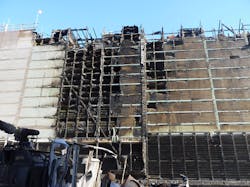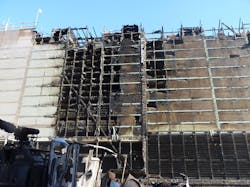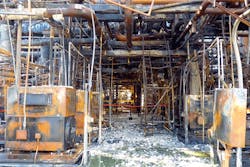On Aug. 6, 2012, a hydrocarbon release and massive fire occurred at the Chevron Refinery in Richmond, Calif. Following an investigation, the U.S. Chemical Safety and Hazard Investigation Board (CSB) released a joint report with Cal/OSHA pointing to sulfidation corrosion as the cause of the incident. CSB stressed that the petrochemical refiners carefully must examine potential corrosion mechanisms and use the safest possible construction materials to avoid experiencing this type of failure.
“The report, resulting from a cooperative effort between the CSB, Cal/OSHA, the United Steelworkers (USW) and Chevron, provides a solid, technical basis for the firm conclusion that the pipe corroded over time from sulfidation corrosion,” said CSB Chairperson Rafael Moure-Eraso.
According to CSB, 19 Chevron employees were engulfed in a vapor cloud formed by the hydrocarbon release in the incident. Eighteen workers escaped before the fire started and one employee escaped without injury after the fire ensued. The incident also resulted in six minor injuries. More than 15,000 residents in the surrounding area sought treatment at area medical facilities as a result of the release and fire.
Anamet Inc., a metallurgical laboratory in Hayward, Calif., prepared the report, which concluded that the 8-inch steel pipe, from a section designated as 4-sidecut that was installed in 1976, ruptured due to severe sulfidation corrosion. Tested pipe samples showed a very low concentration of corrosion-inhibiting silicon.
Production at the crude unit since has been suspended since the accident.
Investigation Found Severe Corrosion
“Based on the CSB’s investigation, the corroded pipe should have been replaced when opportunities arose years earlier,” Moure-Eraso stressed. “On the day of the accident, Chevron should have shut down the crude unit as soon as a leak was observed and removed workers to a safe location. Continuing to troubleshoot the problem and having firefighters remove insulation searching for a leak – while flammable hydrocarbons were flowing through the leaking piping – was inconsistent with good safety practice.”
“This reports confirms what Chevron already knew– that the pipe was severely corroded and should have been replaced – but failed to act on before the August fire,” added Cal/OSHA Chief Ellen Widess. “This failure to act was included among the multiple Serious and Willful Serious citations issued to Chevron.”
Cal/OSHA has issued 25 citations and civil penalties of $963,000; Chevron has announced it will appeal these citations.
“We hope this report receives widespread attention throughout the petrochemical industry as a precaution to all refiners to carefully examine potential corrosion mechanisms and use the safest possible materials of construction to avoid failures. Refineries and other plants must incorporate strong mechanical integrity and inherently safer strategies in their process safety management programs,” Moure-Eraso said.
The CSB investigation to determine the root causes of the incident is ongoing. CSB will release a report detailing its findings and recommendations to key stakeholders later this year. CSB, Cal/OSHA, USW and Chevron also are cooperating under an agreement to test 4-sidecut carbon steel piping from Chevron’s refinery in El Segundo, Calif.
About the Author

Laura Walter
Laura Walter was formerly senior editor of EHS Today. She is a subject matter expert in EHS compliance and government issues and has covered a variety of topics relating to occupational safety and health. Her writing has earned awards from the American Society of Business Publication Editors (ASBPE), the Trade Association Business Publications International (TABPI) and APEX Awards for Publication Excellence. Her debut novel, Body of Stars (Dutton) was published in 2021.


